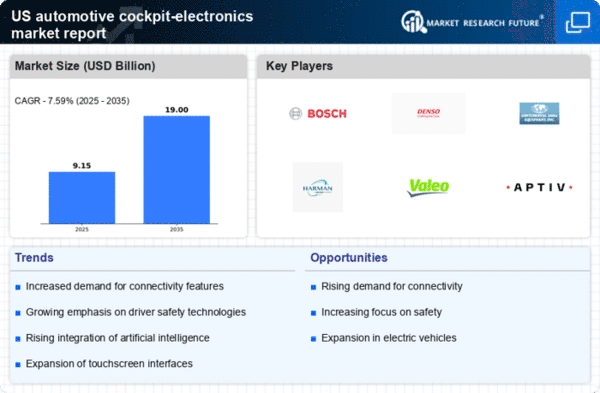Rising Demand for Infotainment Systems
The automotive cockpit-electronics market is witnessing a notable increase in demand. This demand is for sophisticated infotainment systems. As of 2025, the market for automotive infotainment is projected to exceed $30 billion, driven by consumer preferences for seamless connectivity and entertainment options. Features such as smartphone integration, voice recognition, and cloud-based services are becoming essential components of modern vehicles. This trend reflects a broader societal shift towards digital lifestyles, where consumers expect their vehicles to offer the same level of connectivity as their personal devices. Consequently, automakers are prioritizing the development of advanced infotainment solutions, which not only enhance the driving experience but also serve as a competitive differentiator in the automotive cockpit-electronics market.
Shift Towards Electric and Hybrid Vehicles
The automotive cockpit-electronics market is significantly impacted by the shift towards electric and hybrid vehicles. As of 2025, the market for electric vehicles (EVs) is projected to account for over 25% of total vehicle sales in the US. This transition necessitates the development of specialized cockpit-electronics that cater to the unique needs of EV drivers, such as energy management displays and charging status indicators. Furthermore, the integration of smart technologies in EVs enhances user experience by providing real-time data on battery performance and range. This trend indicates a growing alignment between vehicle electrification and advancements in cockpit-electronics, suggesting that manufacturers must adapt their offerings to meet the demands of a rapidly evolving automotive landscape.
Technological Advancements in Display Systems
The automotive cockpit-electronics market is experiencing a surge in demand for advanced display technologies, such as OLED and LCD screens. These innovations enhance user experience by providing high-resolution visuals and improved touch responsiveness. As of 2025, the market for display systems in vehicles is projected to reach approximately $15 billion, driven by consumer preferences for larger, more interactive interfaces. The integration of augmented reality (AR) displays is also gaining traction, offering drivers real-time navigation and information overlays. This trend indicates a shift towards more immersive cockpit environments, which could redefine user interaction with vehicle systems. Consequently, manufacturers are investing heavily in R&D to develop cutting-edge display solutions that cater to evolving consumer expectations in the automotive cockpit-electronics market.
Integration of Advanced Driver Assistance Systems (ADAS)
The automotive cockpit-electronics market is increasingly influenced by the integration of Advanced Driver Assistance Systems (ADAS). These systems enhance vehicle safety and improve the overall driving experience. As of 2025, the ADAS market is expected to grow at a CAGR of around 20%, reflecting a heightened focus on safety features. Technologies such as lane-keeping assist, adaptive cruise control, and automatic emergency braking are becoming standard in new vehicle models. This trend not only addresses consumer demand for safer vehicles but also aligns with regulatory pressures for enhanced safety standards. The incorporation of ADAS into the cockpit-electronics market signifies a pivotal shift towards smarter, more responsive vehicles, potentially reducing accident rates and improving driver confidence.
Consumer Preference for Customization and Personalization
The automotive cockpit-electronics market is increasingly shaped by consumer preferences for customization and personalization. As of 2025, surveys indicate that over 60% of consumers express a desire for tailored cockpit experiences that reflect their individual tastes and needs. This trend is prompting manufacturers to develop modular cockpit systems that allow users to configure their interfaces, from display layouts to ambient lighting. The ability to personalize vehicle settings enhances user satisfaction and fosters brand loyalty. Additionally, this shift towards customization aligns with broader trends in consumer electronics, where personalization is becoming a key driver of product development. As a result, the automotive cockpit-electronics market is likely to see a rise in innovative solutions that cater to the diverse preferences of modern drivers.

















